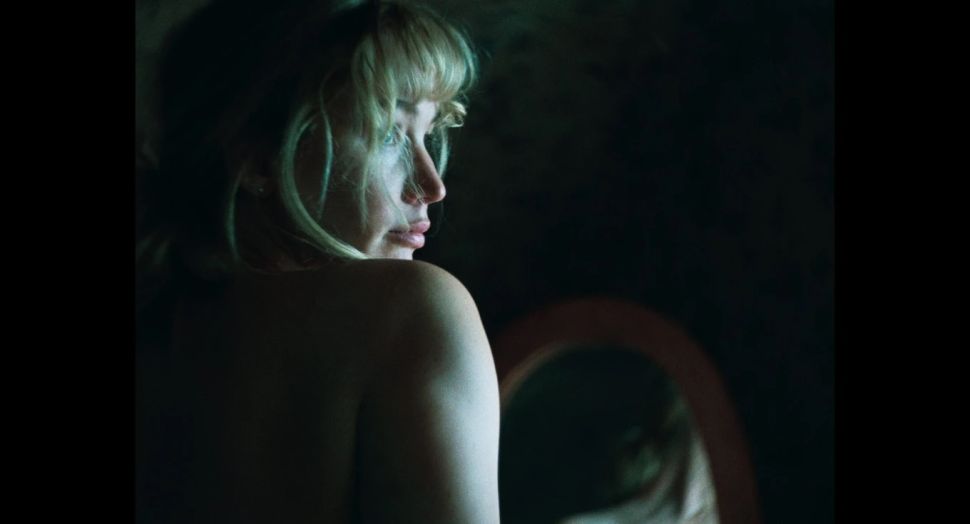Although it eventually loses staying power, Lynne Ramsay’s ferocious relationship drama Die, My Love quickly seeps beneath your skin, practically holding you hostage in its initial half. Ramsay’s first feature in eight years—after the Cannes crime drama You Were Never Really Here—casts Jennifer Lawrence and Robert Pattinson in its leading roles, as Grace and Jackson, a pair of newlyweds who inherit a Montana farmhouse. This rural, isolated setting plays host to the couple’s steadily crumbling relationship, which its actors embody by jumping headfirst into raw, instinctive performances.
DIE, MY LOVE ★★1/2 (2.5/4 stars)
Directed by: Lynne Ramsay
Written by: Lynne Ramsay, Enda Walsh, Alice Birch
Starring: Jennifer Lawrence, Robert Pattinson, Lakeith Stanfield, Sissy Spacek, Nick Nolte
Running time: 118 mins.
At times, Ramsay practically films acting exercises with Lawrence and Pattinson, who crawl along the dusty floors, giving into feline animalism. Their sex is feral and playful, drawing the viewer into the lust and euphoria of their honeymoon stage. However, the movie quickly cuts to several months down the line, after they’ve had a child, and they’ve entered a rut that keeps them at loggerheads.
The film has been touted as one of postpartum depression—given the timing of the duo’s simultaneous breakdown—but this feels like a mis-categorization. If anything, the couple’s woes are catalyzed by Grace staying home to care for their, baby while Jackson spends more and more time away, at a blue collar job whose details we barely learn (we remain largely tethered to Grace’s point of view). The film’s brash, diegetic soundtrack, as Grace oscillates between playing early ‘60s rock and roll and ‘80s bubblegum glam at deafening volume, creates a hair-raising baseline, complemented by disembodied images of a forest on fire. Perhaps this is a premonition involving the woods surrounding the couple’s home, but its abstract nature speaks to how Grace and Jackson are being engulfed by some unseen force, born of their own anxieties.
Seamus McGarvey’s cinematography washes out the movie’s color palette, over-exposing it ever so slightly, so that every scene resembles what one might experience during a head-splitting hangover. His lensing also makes deft and dizzying use of swirling bokeh, imbuing the lush backgrounds with a sensation of vertigo and unease. In keeping with this approach, Ramsay gently twirls the camera around the characters too, introducing gradually more erratic movements for the first few scenes. There isn’t a moment of calm during Die, My Love, placing its most effective moments comfortably alongside Andrzej Żuławski’s 1981 discomforting romance Possession, in which Sam Neill and Isabelle Adjani turn a couple’s divorce into a focal point for psychological horror. Lawrence and Pattinson don’t quite stray that far into genre territory, but their full-bodied commitment proves alluring and amusing.
After laying its cards on the table, it isn’t long before Die, My Love plateaus both narratively and aesthetically. Its back-and-forth screenplay structure renders flashbacks confusing on occasion, forcing your brain to work overtime to scenes in chronological order, though figuring out its confounding emotional inner workings can be part of the fun. Still, the movie’s more esoteric machinations in the present don’t quite fit. LaKeith Stanfield, for instance, plays a minor role as a mysterious, helmeted biker who appears to stalk Grace when Jackson is away, piquing Grace’s curiosity as though he were some phantasmic stand-in for the masculinity and exciting romance Jackson no longer represents for her. But Stanfield’s role is so truncated as to lose even this symbolic meaning.
Beyond a point, the characters don’t brush up against the movie’s established emotional confines more than they do the first time we meet them. The evolution (or de-evolution) of Grace and Jackson’s marriage—alongside the parallel tale of Jackson’s mother (Sissy Spacek) dealing with her own terrifying isolation a few miles away—is a plot largely in stasis. Although the movie hints towards zigs and zags that might make things shocking, or make its drama more rigorous, the malaise the movie depicts is fixed, and unchanging.
On one hand, this mirrors the sensation of being stuck in a dead-end marriage with no excitement or unpredictability. But on the other hand, the movie fails to undergo any meaningful visual, auditory or tonal transformations even once Grace and Jackson find themselves moving through new and challenging phases of their relationship.
Die, My Love arrives like a lightning strike, snatching your attention with its sprawling shots of the couple’s new home through lengthy hallways—shot so that its doorways align, practically creating a deep-focus mise-en-abyme. But this recurring motif of frames-within-frames seldom gives way to deeper reflection on what troubles the young couple once they move to their new abode. Lawrence and Pattinson’s performances are wildly fun, and fearlessly embodied, but they’re forced to maintain a consistently timid emotional trajectory—an unwavering straight line, towards only slightly more discomfort—rather than serving a film that goes full-tilt through the wild mania of a home becoming an asylum, and unruly romance succumbing to malaise.

